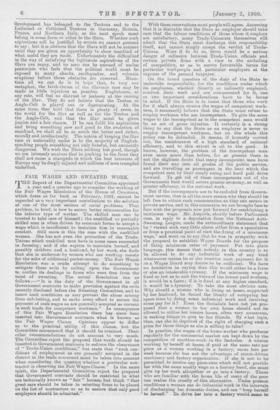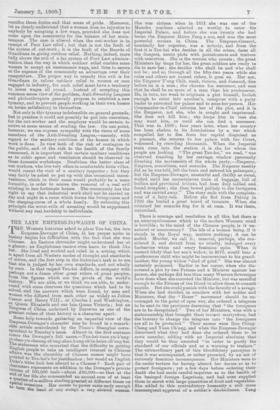FAIR WAGES AND SWEATED WORK.
THE Report of the Departmental Committee appointed a year and a quarter ago to consider the working of the Fair Wages Resolution of the HOUSE) of Commons, which dates as far back as February, 1891, cannot be regarded as a very important contribution to the solution of one of the most serious of social problems. That problem, in brief, is how to secure better remuneration for the inferior type of worker. The Skilled man can be trusted to take care of himself; the unskilled or partially skilled man is often driven by economic forces to accept a. wage which is insufficient to maintain him in reasonable comfort. Still more is this the case with the unskilled woman. She has not even the protection of the Trade- Unions which unskilled men have in some cases succeeded in forming; and if she aspires to maintain herself, and possibly children and a husband, by her work, she finds that she is undercut.by women who are working merely for the sake of additional pocket-money. The Fair Wages Resolution was a crude attempt to do something to mitigate these evils by calling upon the Government to confine its dealings to firms who were free from the taint of sweating. The actual Resolution ran as follows :—" It is the duty of the Government in all Government contracts to make provision against the evils recently disclosed before the Sweating Committee, and to insert such conditions as may prevent the abuse arising from sub-letting, and to make every effort to secure the payment of such wages as are generally accepted as current in each trade for competent workmen." In consequence of this Fair Wages Resolution there has since been inserted into Governmeut contracts what is known as the Fair Wages Clause. Opinions appear to differ as to the practical utility of this clause, but the Committee recommend that it should be retained. Their other recommendations do not amount to very much. The Committee reject the proposal that words should be inserted in Government contracts to enforce the observance of "Trade-Union conditions," but state that "such con- ditions of employment as are generally accepted in the district in the trade concerned must be taken into account when considering the question whether a particular con- tractor is observing the Fair Wages Clause." In the same spirit, the Departmental Committee reject the proposal that Government contracts should be restricted to what are technically known as " fair " houses, but think "that great care should be taken in selecting firms to be placed on the list of contractors so as to ensure that only good employers should be admitted:" With these reservations most people will agree. Assuming that it is desirable that the State as employer should take care that the labour conditions of those whom it employs are satisfactory, many Trade-Unionists themselves will admit that the State must discharge this responsibility itself, and cannot simply accept the verdict of Trade. Unions. Were it to do so, there would be a serious danger of collusion between Trade-Union officials and certain private firms with a view to the excluding of competition, so as to secure favourable terms for particular worlipeople and particular employers at the expense of the general taxpayer.
On the broad question of the duty of the State to undertake responsibility for the conditions under which its employees, whether directly or indirectly employed, conduct their work and are remunerated, for it, one or two important considerations have to be borne in mind. If the State is to insist that those who work for it shall always receive the wages of competent work- men, it necessarily follows that the State must refuse to employ workmen who are incompetent. To give the same wages to the incompetent as to the competent man would be an act of gross injustice. It certainly is a strong thiug to say that the State as an employer is never to employ incompetent workmen, but on the whole this policy can be defended. It means, if honestly carried out, the maintenance, of a high standard of national efficiency, and to this extent is all to the good. It loaves, however, the problem of the incompetent man. even more acute than before, for at present there is not the slightest doubt that many incompetent men have found their way into all grades of the public service,. and are travelling as passengers in the boat which the competent men by their steady swing and hard pull drive, forward. To get rid of these incompetents out of the Government boat would secure greater economy, as well as greater efficiency, in the national work.
But if the incompetents are to be excluded from Govern- ment service, that is all the more reason why they should be left free to obtain such remuneration as they can secure in private service, and in this connexion we fire brought face to face with the proposals now put forward, for establishing a minimum wage. Mr. Asquith, shortly before Parliament rose, in reply to a deputation from the National Anti- Sweating League, made the extraordinary statement that he "viewed with very little alarm either from a speculative or from a practical point of view the fixing of a. minimum, wage," and went on to say. that he was in sympathy with the proposal to establish Wages Boards for the purpose of fixing minimum rates of payment. Put into plaiw language, this means that nobody in this country is to be allowed to do any industrial work of any kind., whatsoever unless he or she receives such payment for it as a Wages Board may decree to be sufficient. We lia.ve no hesitation in saying that this would either be a farce. or else an intolerable tyranny. If the minimum wage is fixed so low as to suit the views of the lowest paid workers, it weukl be a farce; if it is fixed at any higher standard, it would be a tyranny. To take the most obvious case. Why should. a woman who is living at home, supported by her husband, be denied the liberty of occupying her spare time by doing some industrial work and receiving some pay for it? Even the Socialists have not yet pro- posed that a woman in her own home should not be allowed to utilise her leisure hours, often very numerous,' in making things to give to her friends. By v hat logic, then, can she be deprived of the right of charging such a price for those things as she is willing to take?
In practice, the wages of the home-worker who produces regularly for the commercial market are kept down by the competition of machine-work in the factories. A woman working by herself at home, if paid at the same rate per piece as a woman working in a factory, earns less per week because she has not the advantage of steam-driven machinery and factory organisation. If she is not to be permitted to receive any piece-rate which will not provide her with the same weekly wage as a factory hand, she must give up her work altogether or go into a factory. Those who are familiar with the home life of many of the poor can realise the cruelty of this alternative. Under present conditions a woman can do industrial work in the intervals of discharging her domestic duties, and can "keep herself. to herself." To drive- her into a factory would mean to sacrifice those duties and that sense of pride. Moreover, let us clearly understand that a woman does no injustice to anybody by accepting a low wage, provided she does not come upon the community for the balance of her main- tenance. The case is altered when the out-worker is in receipt of Poor Law relief ; but that is not the fault of the system of out-work ; it is the fault of the Boards of Guardians in giving outdoor relief. Nothing, indeed, more fully shows the evil of a lax system of Poor Law adminis- tration than the way in which outdoor relief enables some women to accept an uneconomic wage, and thus to secure at the expense of the community an advantage over their competitors. The proper way to remedy this evil is for Guardians to refuse outdoor relief to women or men engaged in industry, for such relief must have a tendency to lower wages all round. Instead of accepting this common-sense view of the problem, Anti-Sweating Leagues and philanthropists generally propose to establish a new tyranny, and to prevent people working in their own homes on terms satisfactory to themselves.
Not only is this tyranny indefensible on general grounds, but in practice it could not possibly be put into execution, for the out-worker and the employer would be certain to arrive at some means of evading the law. On one point, however, we can express sympathy with the views of some members of the Anti-Sweating Lettgue,—namely, with regard to the sanitary condition of the homes in which work is done. In view both of the risk of contagion to the public, and of the risk to the health of the family concerned, it is important that certain sanitary conditions as to cubic space and ventilation should be observed in these domestic workshops. Doubtless the better class of out-workers, who live very often in comfortable little villas, would resent the visit of a sanitary inspector ; but they may fairly be asked to put up with this occasional incon- venience, which in their cases would. probably be a mere formality, in order to secure the removal of a real evil existing in less fortunate homes. The community has the right to say that industrial work shall not be carried on day and night in a room which forms the living-room and the sleeping-room of a whole family. By enforcing this Principle the worst evils of sweating would. be suppressed. without any real hardship to individuals.













































 Previous page
Previous page